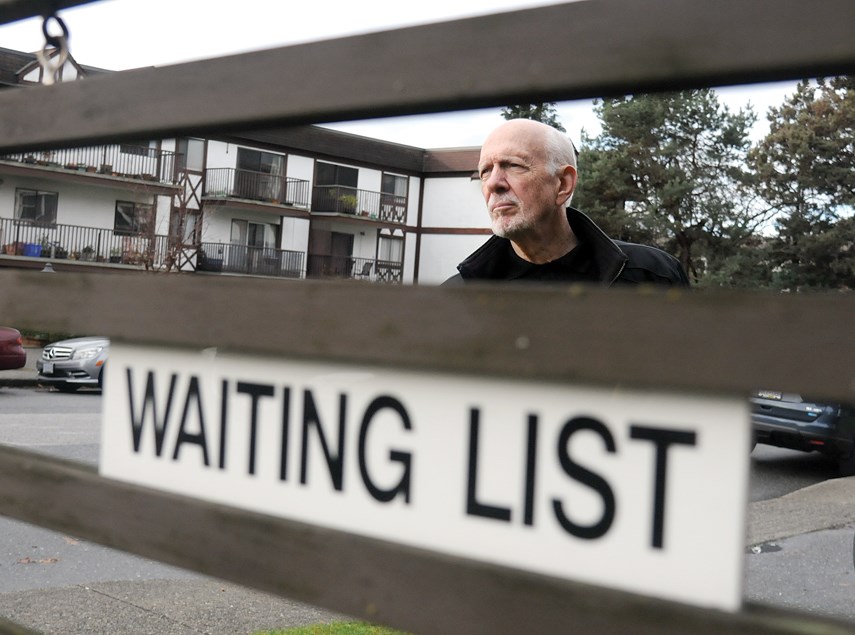Apartment vacancy rates are creeping upwards in two of the three North Shore municipalities, but they are still well below what is considered healthy in the rental market and prices continue to climb.
The Canada Mortgage and Housing Corp. released its annual rental survey on Wednesday showing 1.7 per cent vacancy rate in the District of North Vancouver, up from 0.9 per cent in 2017. West Vancouver also had a slight increase in available units but, at 0.6 per cent vacancy, still remains one of the tightest rental markets Canada. Vacancy rates got worse in the City of North Vancouver, which now sit at 0.8 per cent compared 1.3 per cent the same time last year.
Every October, CMHC contacts rental agencies and property management firms to compile data on vacant purpose-built rental units and privately owned condo units on the rental market.
Across Metro Vancouver, the vacancy rate is at one per cent. A vacancy rate of three to five per cent is considered healthy.
Rents continue their upward mobility, the report notes. The average price of an apartment in the city is $1,424, a 5.2 per cent increase from the $1,333 average last year. The average District of North Vancouver apartment will set you back $1,584 per month, 5.4 per cent more than 2017. West Vancouver remains the most expensive place to rent a home, with an average of $1,896 per month.
But those averages take into account people who have been in one place for a long time and subject to rent controls. Someone trying to find a place today can expect to pay significantly more. The average price of an apartment listing in the City of North Vancouver today, for example, is $1,707. The average price of a vacant unit in the District of North Vancouver during the October survey was $1,936. In West Vancouver, it was $2,699.
And despite an increase in the total number of condominiums being built, there was also a drop in the number of condo units being rented out on a long-term basis, from 3,187 on the North Shore in 2017 compared to 3,022 now, which CMHC attributes to investors selling their rental units to new owners who did not keep the tenants.
The survey does not capture secondary suites in single-family homes, which make up the bulk of the District of North Vancouver’s rental stock, however.
Don Peters, chairman of North Shore Community Resource Society’s Community Housing Action Committee said there has been a steady stream of people contacting his office looking for help finding housing, “which is a hopeless ask,” he said.
“We are overwhelmed with calls,” Peters said. “I’ve got extraordinary tales of desperation and sadly there are no quick answers.”
The society has a volunteer who combs apartment listings across a number of platforms to screen out any listed for less than $1,000-$1,500 per month and email them to anyone who has signed up for the list.
But, Peters said, a tight market means landlords are holding all the cards when it comes to deciding who gets an apartment and how much they pay.
“Municipalities have to step up their game in approving affordable rentals. They just have to. There has to be an ongoing addition of supply. We just have too few available units out there,” he said.
District of North Vancouver Mayor Mike Little said he believes creating more rental supply will bring prices down but, he added, there is a backlog of at least 17 years when there were no new purpose-built rentals constructed at all.
“It’s like climbing a ladder where half the rungs are missing and you can’t cover that spread,” he said.
Little said he expects his council will kick-start a review of the official community plan in the new year, which he said should incorporate the new ability to create rental-only zoning. But, he warned, the benefits won’t be felt for a long time.
“In part, it’s really long-term planning where you’re intentionally building purpose-built rental projects today knowing that their real value is going to be filling a gap down the road,” he said.
At their first meeting, Little and four other members of the new council voted down an 80-unit, below-market rental project on the parking lot of the old Delbrook rec centre.
Little said that was largely due to the process, with the last council having carried out the public hearings but not gone through with a vote on the project, which was not well liked by the Delbrook neighbours. Little said he wants to come up with a project that will work for the community and then find a non-profit housing partner to take on construction.
“All is not lost. We still own the site. We’ve already talked to the applicants,” he said.
West Vancouver Mayor Mary-Ann Booth said she expects her council will see through more purpose-built rental units, as well as below-market rental units intended to be workforce housing. “Council is very concerned and is committed to taking action over the next term to improve the situation,” she said.



